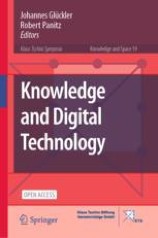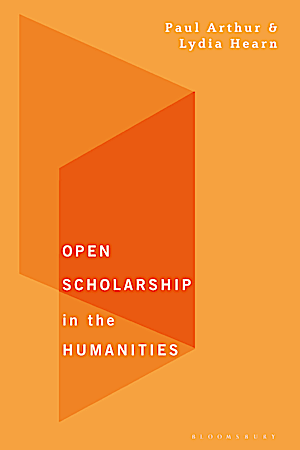In der letzten Zeit sind u.a. diese frei verfügbaren Titel erschienen:
Digital Humanities and Laboratories: Perspectives on Knowledge, Infrastructure and Culture
Urszula Pawlicka-Deger & Christopher Thomson (Hrsg.)
https://doi.org/10.4324/9781003185932
Digital Humanities and Laboratories explores laboratories dedicated to the study of digital humanities (DH) in a global context and contributes to the expanding body of knowledge about situated DH knowledge production. Including contributions from a diverse, international range of scholars and practitioners, this volume examines the ways laboratories of all kinds contribute to digital research and pedagogy.
Acknowledging that they are emerging amid varied cultural and scientific traditions, the volume considers how they lead to the specification of digital humanities and how a locally situated knowledge production is embedded in the global infrastructure system.
As a whole, the book consolidates the discussion on the role of the laboratory in DH and brings digital humanists into the interdisciplinary debate concerning the notion of a laboratory as a critical site in the generation of experimental knowledge. Positioning the discussion in relation to ongoing debates in DH, the volume argues that laboratory studies are in an excellent position to capitalize on the theories and knowledge developed in the DH field and open up new research inquiries. Digital Humanities and Laboratories clearly demonstrates that the laboratory is a key site for theoretical and critical analyses of digital humanities and will thus be of interest to scholars, students and practitioners engaged in the study of DH, culture, media, heritage and infrastructure.
Knowledge and Digital Technology
Johannes Glückler & Robert Panitz (Hrsg.)
https://doi.org/10.1007/978–3‑031–39101‑9
This open access book explores the multifaceted interplay of technology, knowledge, and place. While digital technology is increasingly influencing our way of knowing, conversely it is itself the consequence of human creativity and local social interaction.
Part I analyzes how digital technologies transform markets through artificial intelligence and decentralized blockchain models. Its contributions discuss novel governance mechanisms, including the responsible use and analysis of big data.
Part II illustrates various ways in which technology supports humanity, be it algorithms supporting complex decision-making processes or the use of robotics in care services. The chapters highlight that technology’s efficiency and potential rely on social norms and human capital.
Finally, Part III shows that digitization is generating vibrant entrepreneurship, reflected in geographically clustered urban scale-up economies, as well as opening up new ways for people to connect with one another, organize civic engagement and enable new forms of labor.
The book offers theoretical reflections as well as empirical cases from the United States, Canada, Japan, South Africa, and Europe. This volume provides a valuable read for scholars, students and professionals in the fields of knowledge creation, technology and governance.
Open Scholarship in the Humanities
Paul Longley Arthur & Lydia Hearn
https://doi.org/10.5040/9781350232303
Exploring the rise of open scholarship in the digital era and its transformational impact on how knowledge is created, shared, and accessed, this open access book offers new insights on the history, development, and future directions of openness in the humanities and identifies key drivers, opportunities, and challenges.
The concept of open research is reconfiguring scholarly communication across all disciplines, changing how understandings are produced through more accessible, participatory, ethical, and transparent approaches, reaching and involving far broader and more diverse publics. Considering multiple stakeholder perspectives, Arthur and Hearn argue that for the humanities to proactively contribute to open knowledge at the global scale, new ways of thinking are needed within every part of the system. In the open information economy, the humanities are on a trajectory following the sciences, but parts of the world are almost completely left out. A cultural shift is required for universities to unlock the powerful potential of humanities open scholarship. In this wide-ranging overview, the authors show why and how the global research community must work together for meaningful outcomes.
Open scholarship has undergone a profound change since its beginnings from a call to action to an essential principle in research organizations internationally. However, the core impulse remains: to reshape the information environment and harness the world’s knowledge for the greatest benefit of society.



